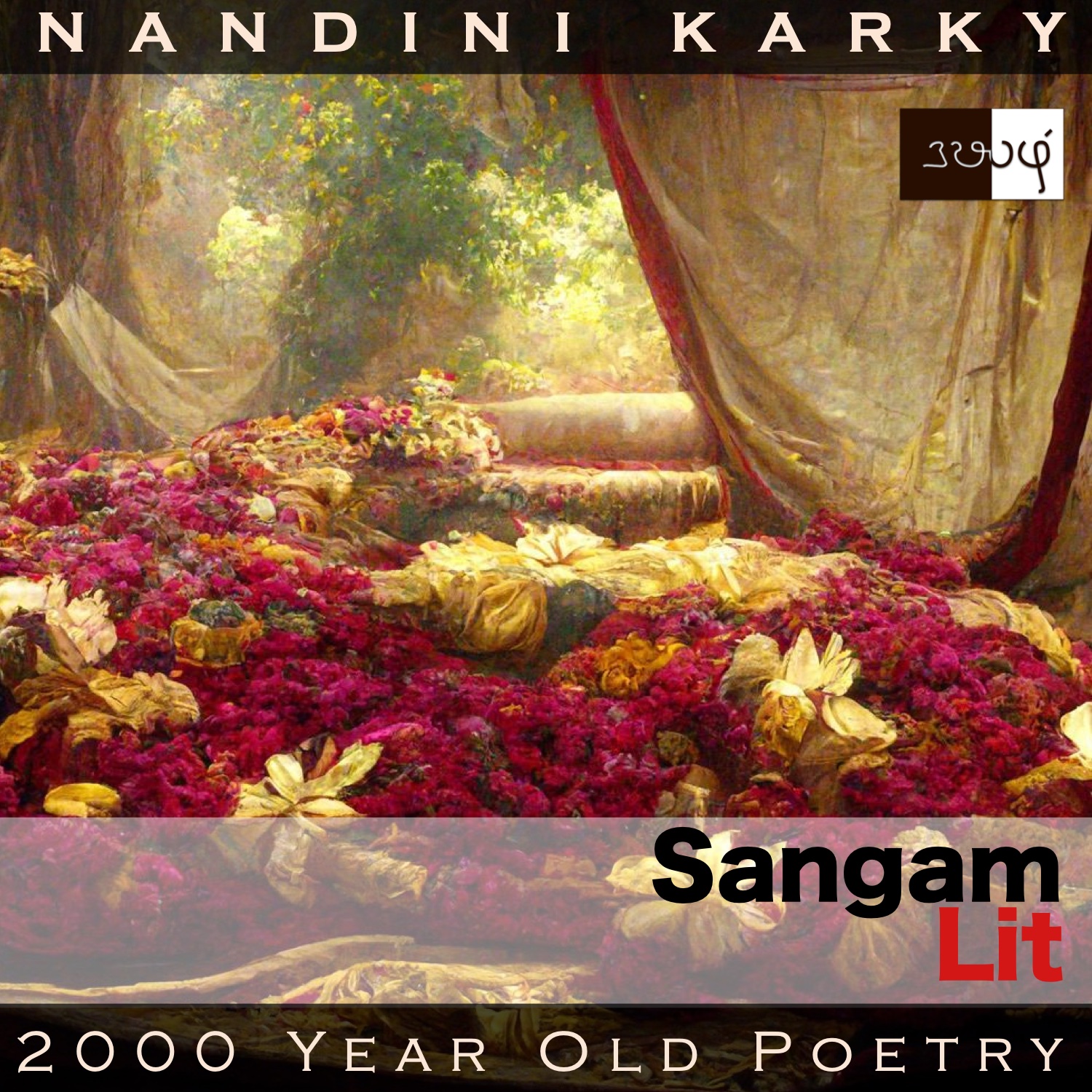Podcast: Play in new window | Download
Subscribe: Apple Podcasts | Spotify | Amazon Music | Android | iHeartRadio | TuneIn | RSS | More
In this episode, we perceive the noble act of a king, as depicted in Sangam Literary work, Puranaanooru 50, penned about the Chera King Thakadur Erintha Peruncheral Irumporai, by the poet Mosi Keeranaar. The verse is situated in the category of ‘Paadan Thinai’ or ‘King’s praise’ and depicts the tolerance and compassion of this Chera king.

மாசு அற விசித்த வார்புறு வள்பின்
மை படு மருங்குல் பொலிய, மஞ்ஞை
ஒலி நெடும் பீலி ஒண் பொறி மணித் தார்,
பொலங் குழை உழிஞையொடு, பொலியச் சூட்டி,
குருதி வேட்கை உரு கெழு முரசம்
மண்ணி வாரா அளவை, எண்ணெய்
நுரை முகந்தன்ன மென் பூஞ் சேக்கை
அறியாது ஏறிய என்னைத் தெறுவர,
இரு பாற்படுக்கும் நின் வாள் வாய் ஒழித்ததை
அதூஉம் சாலும், நல் தமிழ் முழுது அறிதல்;
அதனொடும் அமையாது, அணுக வந்து, நின்
மதனுடை முழவுத்தோள் ஓச்சி, தண்ணென
வீசியோயே; வியலிடம் கமழ,
இவண் இசை உடையோர்க்கு அல்லது, அவணது
உயர் நிலை உலகத்து உறையுள் இன்மை
விளங்கக் கேட்ட மாறுகொல்
வலம் படு குருசில்! நீ ஈங்கு இது செயலே?
One particular incident involving the poet forms the core of this song on the Chera King Peruncheral Irumporai. The poet’s words can be translated as follows:
“The war drum was one made of faultless black wood pulled and tied with strong straps, covered with long and luxuriant peacock feathers and sapphire-hued garlands, and adorned with thick clusters of love-vines with golden flowers. Before this blood-seeking war drum returned from its cleaning, coated with oil, seeing only a soft bed of flowers, I climbed upon its royal platform and rested. When you came upon this scene, the act of preventing your sword from splitting me into two, with fury, is by itself sufficient for all of Tamil land to celebrate you. But, not stopping with that, you came near, and with your handsome shoulders, akin to drums, you fanned me and spread coolness around me. Did you do this because you heard so clearly that other than for those, who make their living spaces spread with the fragrance of fame, the higher world will not welcome them? O strong and victorious king, tell me the reason for this action of yours!”
Time to delve into the details of this verse! The poet starts with the description of an object, narrating how it was made of long, black wood and it was tied with straps. On top of it, peacock feathers, blue-hued garlands and yellow flowers of the love-vine were tied around. This is the war drum that we have seen in many Puranaanooru verses, the one thought to roar aloud for the blood of the enemy. On returning from one such battle, the drum had been taken for a wash, after which it would be coated with oil. Before it returned from this clean-up, the poet, happened to see its royal platform and seeing only a bed of flowers there, exhausted by his long travel, climbed upon it and fell asleep. This royal platform for the Chera king’s war drum was a scared object under royal decree, and anyone trespassing were to be put to death. However, when the king came upon the scene of the poet sleeping peacefully, not only did he set aside his sword that should have cut the poet into two but also took what is called a ‘samaram’ in Tamil, a fly-whisk or fan-like object, to wave around the sleeping poet, spreading cool air all around him. Upon waking, the poet declares just the fact the king did not kill him would put all of Tamil land to awe. But not stopping with that, the king went on to fan the sleeping scholar too, making the poet ask in wonder, ‘Why did the king do that? Was it because he heard only those who have fame in this world have a place for them in the higher world or was it something else?’.
The striking element in this verse is the strong belief even in those ancient times that rules and laws were not meant to be followed rigidly, without any thought. Yes, it was the law that anyone trespassing on that royal platform was to be punished by death. But what superseded that, was the kindness in the king’s heart and the respect he had for this Tamil poet. A verse that should invite us to ponder about our habits and customs, and be open about changing the same, rather than follow them verbatim, just because we have always done that or have been told to do that!




Share your thoughts...